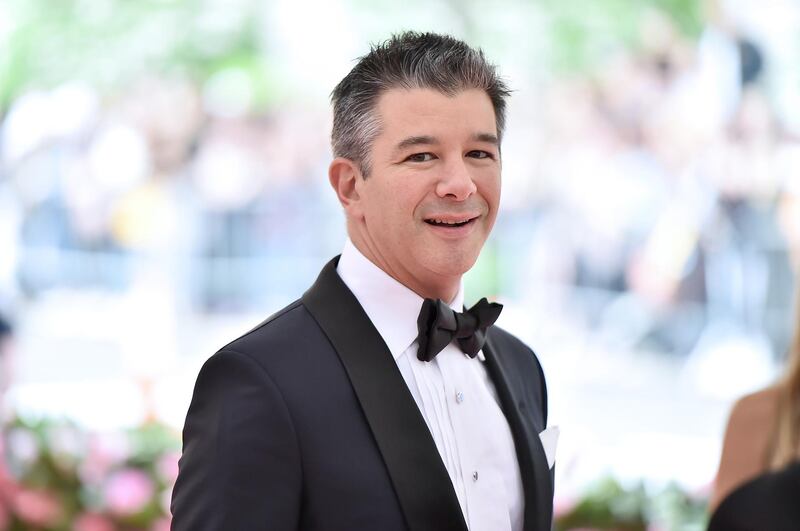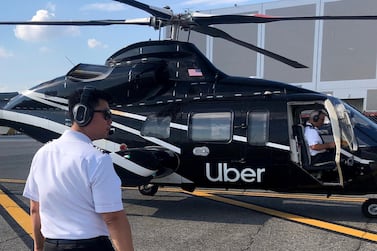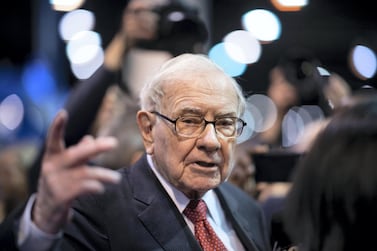Travis Kalanick
Travis Kalanick sold about 20 per cent of his stake in Uber Technologies this month.
Mr Kalanick, 43, a director at the ride-hailing company, sold 20.3 million shares worth about $547 million (Dh2 billion) that were held in a trust, according to a regulatory filing.
The trades came after a 180-day lock-up period restricting insider and early investor sales following May’s initial public offering. They were among the large stake disposals that pushed the stock down to an all-time low.
Uber has underwhelmed investors in the public markets so far. The shares have tumbled 40 per cent since the IPO, reducing the San Francisco-based firm’s value from almost $76bn at its listing to about $46bn.
Mr Kalanick, who was ousted as Uber’s chief executive in 2017, remains one of tech’s richest entrepreneurs. Even after the sale, he still owns 78 million shares in Uber — a 4.6 per cent stake — and has a net worth of about $3.7bn, according to the Bloomberg Billionaires Index.
In March of 2018, Mr Kalanick created a fund called 10100, saying in a tweet it would focus on his “passions, investments, ideas and big bets”. That month he announced he was buying a controlling stake in a distressed real estate company called City Storage Systems for $150m and installing himself as chief executive.
His latest business, CloudKitchens, secured $400m of funding from Saudi Arabia's Public Investment Fund, which valued the food start-up at $5bn, the Wall Street Journal reported.
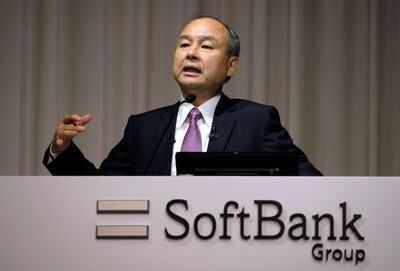
Masayoshi Son
Fresh from the WeWork debacle, SoftBank chief executive Masayoshi Son says he now aims to be more cautious about the timings of IPOs, a shift that could squeeze the Japanese company's funding and increase its reliance on its lower-growth telecom business.
Mr Son said SoftBank Group's $100bn Vision Fund would now look to see companies list when they were closer to achieving profitability.
"I have started to think we should be more cautious on timings for IPOs of companies like WeWork, Uber and Slack," Mr Son said after admitting to poor judgment over WeWork. His company spent more than $10bn to bail out the start-up after an IPO attempt flopped.
However, the billionaire boss stressed that several companies from the fund's portfolio would go public in both 2020 and the year after. SoftBank is counting on new listings to raise cash for its recently announced second Vision Fund, to which it has committed to invest $38bn.
Mr Son's comments about office-sharing firm WeWork were remarkable admissions for an executive well known for his ebullience.
"My investment judgment was poor in many ways," the 62-year-old said after SoftBank Group plunged to its first quarterly loss in 14 years, adding he had turned a blind eye to problems with WeWork co-founder Adam Neumann.
WeWork was not the first setback involving SoftBank investments and stock market debuts. While shares in Uber have fallen by more than a third since its listing, shares of Slack Technologies, which develops productivity software, have tumbled by almost half.
The telecom unit was a rare bright spot in SoftBank's earnings this week, reporting a 9 per cent increase in second-quarter operating profit.
In the year to March 2019, the unit contributed 725bn yen (Dh24.4bn) in operating income, accounting for 30 per cent of the group's operating income. The wider group posted an operating loss of 704bn yen, with its Vision Fund losing 970bn yen.
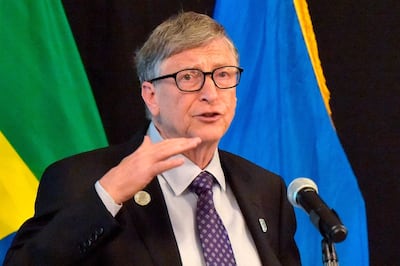
Bill Gates
Microsoft co-founder Bill Gates joined other billionaires in criticising US Democratic presidential candidate Elizabeth Warren for her signature wealth tax.
In an appearance at the New York Times DealBook Conference earlier this month, Mr Gates said he has paid $10bn in taxes and wouldn’t have minded paying twice that, but joked that, “When you say I should pay $100 billion then I’m starting to do a little math about what I have left over”.
Mr Gates supports higher estate taxes and “super progressive tax systems,” but questioned whether Ms Warren’s 6 per cent tax on assets of the wealthy would prove counterproductive.
“I do think if you tax too much, you do risk the capital formation'’ and innovation, as well as imperilling the US “as the desirable place to do innovative companies”, he said.
Ms Warren’s tax would apply to households worth $50m or more and would pay for a bevy of progressive proposals including her $21 trillion Medicare For All plan.
JP Morgan Chase chief executive Jamie Dimon, investor Leon Cooperman and Charles Schwab have all criticised the tax. They argue that tax-the-rich proponents underplay the charitable contributions the wealthy already make to society through philanthropy.
Mr Schwab, 82, who founded the giant discount brokerage firm in the 1970s, said he and his wife have backed causes including the arts and Alzheimer’s research for decades.
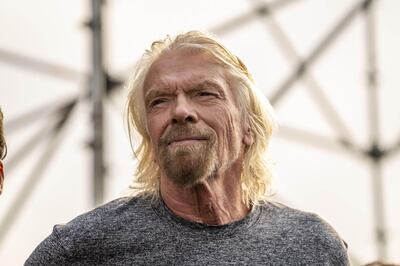
Richard Branson
British billionaire and Virgin founder Richard Branson apologised last Tuesday for posting a picture on Twitter he admitted "clearly lacked diversity" as he launched his new entrepreneurship development centre in South Africa.
On Monday he had tweeted a picture of himself and eight others captioned "We aim to become the heart of entrepreneurship in Southern Africa".
It featured no blacks in a country where they make up 80 per cent of the population.
That sparked outrage as racial tensions remain high and the majority black population is still economically marginalised 25 years after the demise of apartheid.
"Where did you find so many white people in South Africa?" one tweet said.
I wish there were more BLACK entrepreneurs in this picture. 😞
— Noms Bomba (@NomsBomba) November 12, 2019
Following the flurry of angry and sarcastic tweets targeting the mogul, who runs a chain of gyms in South Africa and whose airline daily flies the London-Johannesburg route, Mr Branson deleted the tweet and apologised.
The Branson Centre of Entrepreneurship is for all South Africans, but yesterday's choice of a photo to go with my tweet clearly lacked diversity. Apologies. I hope you will take a look at my blog which does far better justice to the amazing work of the Centre and its team.
— Richard Branson (@richardbranson) November 12, 2019
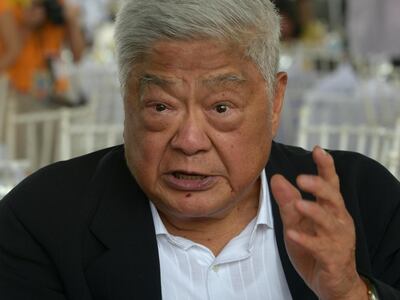
John Gokongwei Jr
Filipino billionaire John Gokongwei Jr, who built a business empire spanning from banking, retail to aviation, has died. He was 93.
Mr Gokongwei died on November 9 “surrounded by his loved ones” at the Manila Doctor’s Hospital, his son Lance Gokongwei said in a statement. He’s survived by his wife, six children and at least 12 grandchildren.
Born in Fujian, China, and raised in Cebu province in the Philippines, Mr Gokongwei started working in his early teenage years after his father died, riding his bike to sell peanuts and knick knacks in neighbouring towns across the island to provide for his five siblings.
That laid the foundation for a business acumen that helped build a $3.4bn fortune, making him one of the country’s wealthiest people, according to the Bloomberg Billionaires Index.
He eventually set his sights farther, travelling two weeks by sea and six hours by land each time to peddle rubber tires in Manila. With the money he saved, Mr Gokongwei went into cornstarch production — which eventually evolved into Universal Robina Corporation, now a 333.9bn peso (Dh24bn) snacks, sweets and beverage business operating in six countries across Asia. Its known for such home-grown products as Chippy corn chips and C2 tea drinks.
His holding firm JG Summit Holdings also has interests in petrochemicals, property and banking.
One of the tycoon’s most recent successes was the steady ascent of Cebu Air, a carrier he founded in 1996 with only four aircraft. It endured a difficult start with a plane crash that killed 104 people and struggled against flag carrier Philippine Airlines.
Its low-cost model allowed it to tap burgeoning travel demand in the country and the region. Not only did it eventually surpass its rival to become the country’s largest domestic carrier, its passenger count is poised to increase tenfold by this year to a record 23 million.
Long before his death, the late billionaire has handed over the reins to his son Lance, who heads his key companies.
